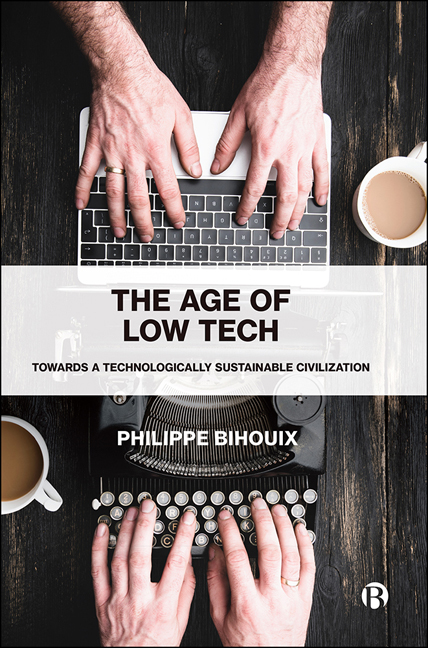Book contents
- Frontmatter
- Contents
- List of Figures and Tables
- Acknowledgements
- Preface to the English Edition
- Prologue: The Mad Dance of the Shrimps
- Part I The Rise and Fall of ‘Engineering Miracle-Workers’
- Part II The Principles of Simple Technologies
- Part III Daily Life in the Era of Simple Technologies
- Part IV Is ‘Transition’ Possible?
- Epilogue: A Dream If Ever There Was One
- Notes
- Index
Part III - Daily Life in the Era of Simple Technologies
Published online by Cambridge University Press: 19 March 2021
- Frontmatter
- Contents
- List of Figures and Tables
- Acknowledgements
- Preface to the English Edition
- Prologue: The Mad Dance of the Shrimps
- Part I The Rise and Fall of ‘Engineering Miracle-Workers’
- Part II The Principles of Simple Technologies
- Part III Daily Life in the Era of Simple Technologies
- Part IV Is ‘Transition’ Possible?
- Epilogue: A Dream If Ever There Was One
- Notes
- Index
Summary
It is now time to sketch out what the application of these worthy principles might do to our daily lives, without yet making any assumptions about their political, economic, social or cultural feasibility.
Of course, you shouldn't be too sceptical as you read this, thinking that these measures and structural changes are unreal, irresponsible and utopian. Of course, they are alarming, out of line with current trends and societal norms, damaging to jobs and clearly impossible to implement in the context of global competition. We will address these crucial issues in Part IV.
At this point it is also unnecessary to describe in any detail the conditions and mechanisms for transformation, to speculate on the role that might be played by various stakeholders (political, social or other), or to list the concrete steps to be taken, the laws to be enacted or the costs and benefits of particular changes. It is not yet the time for that. Let us for the moment set out what needs to be changed and the general directions that could or should be adopted. Let us see where we should go before we consider how to get there; let us try to develop some conviction. The political, fiscal, regulatory and diplomatic measures and the like, and their cultural and moral implications, will follow more easily, but we should not forget the lessons of the past, namely that the end does not necessarily justify the means.
For the moment, let us imagine, purely as a hypothesis, that we can find a way to reverse the current worrying trends, and let us immerse ourselves for a moment in everyday life in a time of simple technologies. How could and should we feed, move and house ourselves, communicate, trade and consume? In short, how might we live?
Agriculture and food
Let us start with food because, on the one hand, we have seen that feeding a growing world population is never going to be simple, while on the other, human nature is such that one approaches almost everything with a greater serenity if one has a full stomach. According to the old adage, only three meals separate a society from chaos.
- Type
- Chapter
- Information
- The Age of Low TechTowards a Technologically Sustainable Civilization, pp. 81 - 134Publisher: Bristol University PressPrint publication year: 2020



